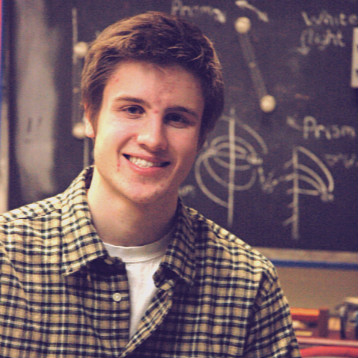Understanding the universe

A desire to better understand the universe will send an Acadia physics honours student packing this summer to take on a prestigious research opportunity. Matthew Bluteau is one of five Canadian physics students to be awarded a Canadian Institute of Particle Physics (IPP)/CERN summer student research fellowship. CERN is the European Organization for Nuclear Research.
Bluteau will spend two months at Simon Fraser University reviewing data for CERN, and then he will head to Geneva to work at CERN headquarters, which is home of the world’s most powerful particle accelerator, the Large Hadron Collider.
“It’s amazing to have this opportunity,” says Bluteau. “I am interested in particle physics and also alternate forms of energy, so working on this project will give me a chance to explore my options in a real world setting.”
Bluteau, who hails from Halifax, Nova Scotia, says the small classes and individual attention he receives at Acadia have allowed him to excel in his field. Last summer, he worked with Acadia researcher Dr. Michael Robertson, a Canada Research Chair in Material Science. Bluteau collected and analyzed data using transmission electron microscopy (TEM) techniques. He is part of a collaborative research team that has submitted its findings for publication.
“It is not common for a student after their second year of studies to be a co-author on a refereed journal publication,” says Robertson. “Matthew’s contributions during his four-month work period were exceptional.”
Robertson adds that Bluteau’s desire to pursue studies at the graduate level in particle physics will be greatly enhanced by working with CERN. Bluteau is following in the footsteps of other Acadia physics students who have assisted researchers at CERN in the past.
“I came to Acadia because of its high academic reputation, and because it is close to home, but far enough away to allow me to get the best university experience,” says Bluteau. “It’s been amazing at Acadia, and now it’s helping me get this opportunity.”
Now in his third year of studies, Bluteau says his interest in physics is growing. “Physics can be daunting because of the math and theory involved, but at the end of the day you can come to a fundamental understanding of what happens in the universe – that is what’s most rewarding.”
A National Sciences and Engineering Research Council undergraduate student research grant and the IPP/CERN student program will pay for his travel costs, while a stipend will cover his expenses in Canada and Europe respectively. Bluteau’s work will culminate with an honours thesis written at Acadia.
